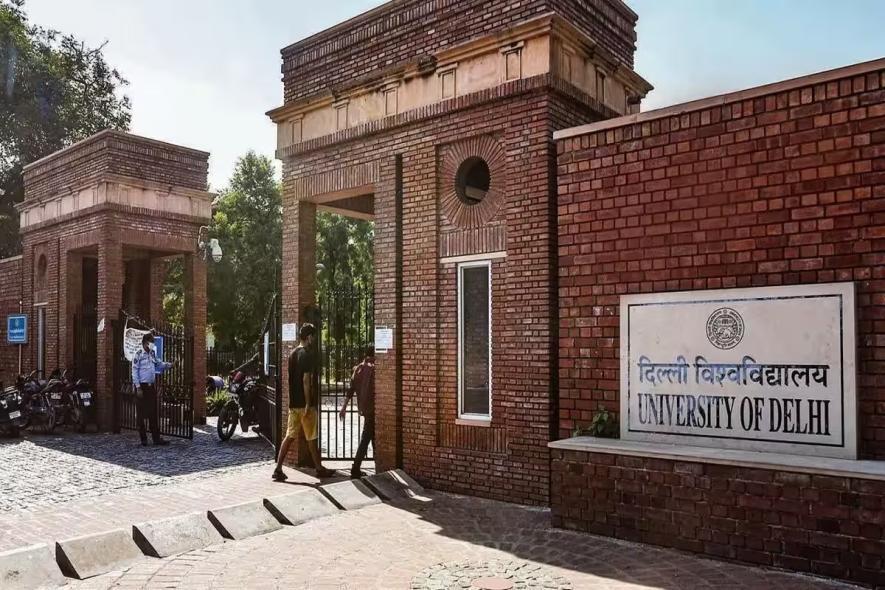DU: Standing Committee Passes Syllabus of 19 Subjects, Teachers Allege Grave Shortcomings

The plans to implement a four-year undergraduate programme at Delhi University were laid bare by the members of the standing committee on academic matters, who alleged that the administration gave no time to draft a concrete syllabus for upcoming students. The teachers maintained that it was futile to discuss the syllabus for only one semester, whereas the syllabus and structure for the other seven semesters were still unknown.
The standing committee meeting on academic matters on Wednesday witnessed chaos when four members gave their dissent about the haste and undecided structure of the courses.
Biswajit Mohanty, Associate Professor of Political Science at Deshbandhu College, who gave a written dissent note, told NewsClick that the university took a lackadaisical approach and sent the agenda items for discussion just 12 hours before the meeting, eliminating any chance of homework for the syllabus revision.
"The agenda item reached the elected representatives barely 12 hours before the commencement of the meeting. As the syllabi would affect the careers of thousands of students and other universities hoping for Delhi university's leadership in formulating quality syllabi, questions about the rationale and urgency of the meeting held today were raised. There was no convincing answer from the authorities to the question raised by the members."
He added that members felt that insufficient time was given for minute observation of the syllabi of 19 subjects to be passed.
"Since many departments had not made the syllabi available in the public domain for wider consultation of stakeholders, informed deliberation on the content of the syllabi and qualitative suggestions would be impossible to make on very short notice."
Kumar Shantanu, Assistant Professor of Botany who came to the meeting, told NewsClick that the university has asked teachers to prepare the syllabus in bits and pieces, generating issues of overlapping and repeat papers.
"It is correct that the syllabus will be prepared by a team of people, and no single person is capable of finalising it. However, it was prepared in cooperation with other teachers who closely monitored any overlaps. When preparing the syllabus for only the first year, you leave the scope for overlapping papers to be taught. The administration still does not have a clear picture of the structure of the entire course. This is unimaginable where you are indecisive about what students will learn in coming semesters."
He added, "Our objection also pertained to the non-availability of the syllabi of several core subjects. As it is an integral part of the four-year structure, it must be evaluated by keeping the contents of other papers in mind. It is here that that major overlapping of the contents may happen."
The university's teachers have maintained that the new course structure compels students to spend 1/3rd more time and money learning subjects than students learned in traditional three-year courses. The three-year course offered 148 credits, where 108 credits were earmarked for core subjects. In the new structure, the students will earn 80 credits of core subjects out of a total of 176 credits.
The teachers' bodies have also said that reducing core subjects would lead to a large displacement of teachers, and colleges would prefer to hire teachers only if the students demand a subject. The course structure proposed by University Grants Commission (UGC) also talks about the first three semesters to be made necessary for all students and the other five semesters dedicated to core subjects. They termed it bewildering because the students may not be interested in pursuing the same subjects they learned in intermediate classes.
However, the biggest concern among student groups is the butchering of the dreams of poor students to get into higher education institutions through the introduction of the Common University Entrance Test (CUET).
Commenting on the issue, Abhishek Kumar from the Students Federation of India told NewsClick that the exercise should be seen in dictates of UGC, which released its draft syllabus and instructed universities not to differentiate the content by more than 30%.
"The students came to Delhi University because its teachers drafted an updated course curriculum. They had the freedom and indeed autonomy to draft the syllabus. So, the repercussions are visible now. University not giving enough time to teachers to prepare syllabus is a step in this direction. As far as CUET is concerned, we have reiterated that the poor students will find it difficult to crack the exam because they will not have enough money for expensive coaching classes."
Get the latest reports & analysis with people's perspective on Protests, movements & deep analytical videos, discussions of the current affairs in your Telegram app. Subscribe to NewsClick's Telegram channel & get Real-Time updates on stories, as they get published on our website.























